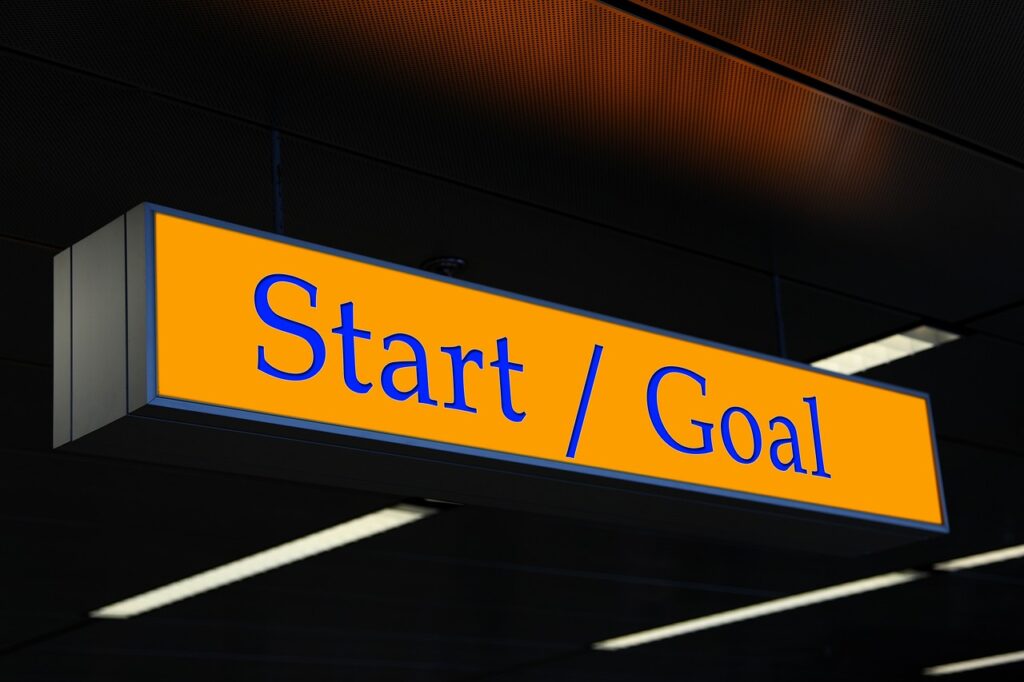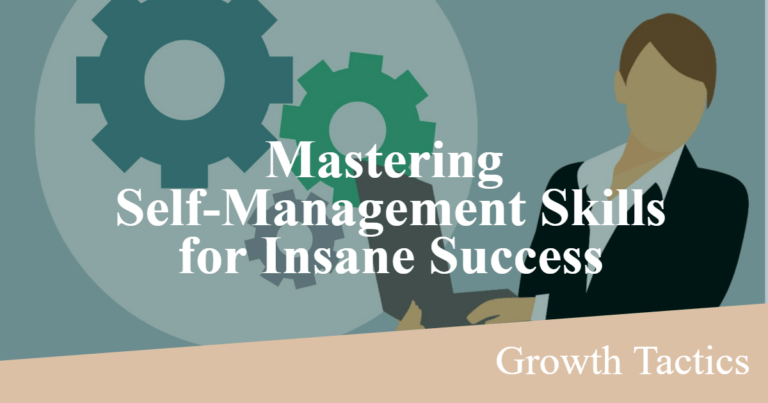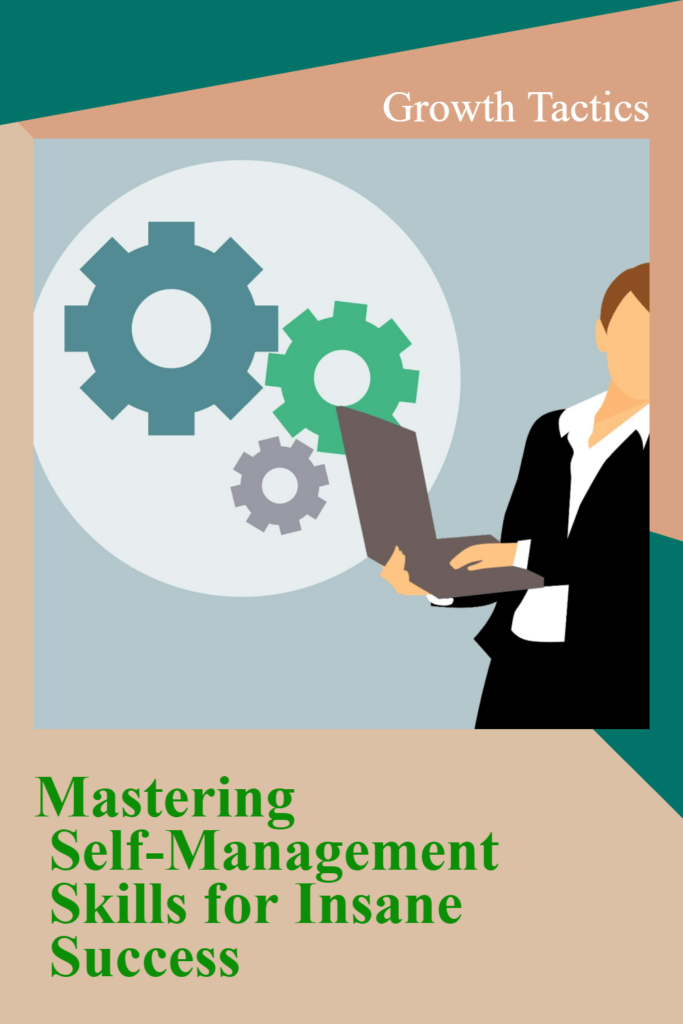Self-management skills are essential for success in both your personal and professional life. These skills allow you to take control of your thoughts, emotions, and behaviors in order to maximize your productivity, achieve your goals, and maintain a healthy sense of calm and focus. Self-management involves a wide range of competencies including time management, stress management, self-motivation, goal setting, organizational skills, and more. By mastering self-management, you gain the ability to independently regulate your actions without the need for external management.
Jump To Section
What are Some Vital Self-Management Skills
Some of the key self-management skills we will cover in this guide include:
- Time management techniques to improve productivity
- Setting achievable goals and plans
- Managing stress and emotions
- Developing self-motivation
- Exhibiting self-control
- Practicing self-reflection
- Organizational skills for efficiency
Developing strong self-management skills can help you become more productive in the workplace, collaborate effectively with others, and achieve the success you want in your personal and professional life. With dedication and practice, anyone can improve their self-management abilities.
Time Management Techniques

Time management skills are essential for success in both your personal and professional life. By learning techniques to effectively manage your time, you can maximize productivity, reduce stress, and achieve your goals. Here are some key time management techniques:
Prioritize Important Tasks
- Make a daily to-do list each morning and prioritize the 3-5 most important tasks that need to be completed that day. Rank tasks based on importance and urgency. Focus on high priority tasks first.
- Use the 80/20 rule – 80% of your results come from 20% of your effort. Identify and focus on the 20% of tasks that will yield the best results.
- Schedule time on your calendar to complete priority tasks when you are most productive. Block off chunks of time dedicated solely to important projects.
Avoid Procrastination
- Break large tasks down into smaller, more manageable steps to avoid feeling overwhelmed. Tackle the first small step right away to build momentum.
- Use the “2-Minute Rule” – if a task will take less than 2 minutes, do it immediately instead of putting it off. Little tasks add up.
- Reward yourself after completing unpleasant or difficult tasks. Build in incentives to stay motivated.
Eliminate Distractions
- Minimize interruptions by turning off notifications, closing extra browser tabs, and silencing your phone when you need to focus.
- Use apps like Freedom to block distracting websites during work sessions. Or work offline when possible.
- Designate a space as your distraction-free zone, whether it’s your office or desk. Only work there.
- Take breaks between tasks to check emails, messages, and notifications so they don’t interrupt focused work.
Setting Achievable Goals

Setting clear, achievable goals is an essential self-management skill that can help improve your productivity and motivation. Goals should follow the SMART framework – Specific, Measurable, Achievable, Relevant, and Time-bound. Having both short and long-term goals is important.
Short-term goals provide quick wins and motivation boosts, while long-term goals give you an overarching vision to work toward. Make sure to set goals that are challenging but realistic based on your current abilities. Breaking large goals down into smaller milestones makes them more manageable.
It’s important to track your progress to stay motivated. Use a journal, spreadsheet, or app to record your progress over time. Seeing visible results will keep you focused and committed. Review your goals regularly and adjust them as needed based on changing priorities or abilities. Celebrate when you achieve milestones along the way.
Setting SMART goals, balancing short and long-term goals, and tracking progress are key techniques for achieving your objectives through strong self-management. With practice, you can master the art of setting and accomplishing challenging but achievable goals.
Improving Focus and Productivity
Improving focus and productivity is essential for effective self-management. With so many distractions and responsibilities competing for our attention, it’s critical to implement strategies to stay focused on the most important tasks.
One of the biggest barriers to sustained focus is multitasking. While we may think we’re getting more done by switching between tasks, research shows multitasking significantly reduces productivity. When our attention is divided, we lose time to context switching and make more mistakes. To improve focus, reduce multitasking by working on one task at a time. Give your full concentration to the current project before moving to the next item.
Use focus techniques like the Pomodoro method to maximize your attention for 25-minute periods. Set a timer and work without interruption until it goes off. Take a short 5-minute break, then start another 25-minute Pomodoro. This rhythm of intense focus alternated with brief breaks can dramatically boost productivity.
Carefully planning your workflow can also improve focus. Chunk projects into distinct stages and tackle one stage at a time. Remove distractions from your environment and create procedures to minimize interruptions. For example, set specific hours for email instead of checking it constantly. Streamline processes and tools to reduce unnecessary steps. With more structure and less clutter, you can zero in on important work.
By curbing multitasking, utilizing focus techniques, and optimizing workflow, you gain control over your attention. This enables you to be more present, make faster progress, and produce higher-quality work. Sharpening your focus leads to peak productivity.
Managing Stress and Emotions

Managing stress and emotions is a critical self-management skill. Unmanaged stress can quickly lead to burnout, while inability to control emotions can damage relationships and derail productivity.
The first step is identifying your stressors and emotional triggers. What situations tend to spike your stress levels? Do certain people or tasks elicit strong negative emotions? Increased self-awareness of your triggers enables you to better prepare for or avoid them.
Relaxation techniques like meditation, deep breathing, and yoga have been scientifically proven to reduce stress. Set aside time each day to calm your mind – it will pay dividends. Maintaining work-life balance is also key. Be sure to take breaks, unplug, and make time for hobbies, loved ones, and self-care.
Don’t bottle up emotions. Find healthy outlets like journaling, talking to a friend, or exercising. Emotional intelligence involves recognizing and constructively channeling your feelings rather than suppressing them. With practice, you can stay composed under stress and minimize daily frustrations.
Developing Self-Motivation
Self-motivation is an essential self-management skill that allows you to take initiative and persist through challenges. Here are some effective techniques for developing stronger self-motivation:
Creating Systems of Accountability
Set up regular check-ins with a mentor or peer group to report on your progress. Knowing you need to provide status updates will help motivate you to follow through. You can make accountability more fun by doing check-ins with a friend and making it a two-way street.
Rewarding Progress
Don’t just reward yourself when you fully complete a big goal. Build in smaller rewards for hitting key milestones along the way. Recognizing incremental progress helps reinforce self-motivation and makes the process more engaging. Useful rewards include small treats, leisure activities, or personal time.
Cultivating Passion
When you actively enjoy your work, self-motivation comes more naturally. Reflect on what drew you to this field in the first place. Read inspirational material, listen to motivating speakers, and find ways to inject more meaning into mundane tasks. Staying connected to your passion will make self-motivation feel effortless.
Exhibiting Self-Control
Self-control is an essential self-management skill that involves regulating your impulses, avoiding procrastination, and maintaining focus on important tasks. This allows you to resist temptations that may interfere with achieving your goals. Some techniques for improving self-control include:
- Impulse control techniques: When you feel an urge to act on impulse, pause and take some deep breaths. Consider the consequences before acting. Distract yourself by going for a walk or calling a friend.
- Avoid procrastination: Break large tasks down into smaller, more manageable steps. Set deadlines for each mini-task. Reward yourself after completing each step. Start with the hardest task first.
- Maintain focus: Eliminate distractions like phone notifications and find a quiet workspace. Take regular breaks to recharge. Use productivity tools to stay on track. Set a timer for 25-30 minutes and focus only on your task until the timer goes off.
With consistent practice, these self-control skills will help you stay focused on your priorities, avoid distractions, and make steady progress on goals. You’ll be able to regulate your thoughts, emotions, and behaviors in a way that sets you up for success.
Practicing Self-Reflection

Self-reflection is an essential self-management skill that allows you to become more self-aware and continuously improve. By regularly reviewing your goals, progress, and experiences, you can identify areas for improvement and development.
Some techniques for practicing self-reflection include:
- Journaling – Keeping a journal is a great way to process your thoughts, emotions, and experiences. Set aside time each day or week to write about your goals, challenges, lessons learned, and ideas for growth. Journaling helps you gain clarity, perspective, and insights.
- Meditation – Daily meditation provides space for inner reflection. It allows you to clear your mind and tune into your inner voice. Consider what’s working well in your life and what you’d like to change. Meditation can enhance self-awareness.
- Reviewing goals and progress – Schedule time to regularly review your goals and assess your progress. Identify any gaps between your current state and your desired state. Consider what’s helping you succeed, as well as obstacles. Adjust your goals or plans as needed.
- Soliciting feedback – Asking for feedback from trusted mentors, coaches, or colleagues can provide valuable insights into your blind spots. Be open to critique and use it to fuel your personal development.
- Practicing mindfulness – Striving to be fully present throughout your day enhances self-awareness. Notice your thoughts, emotions, and behaviors objectively. Observe how you respond to challenges. Mindfulness helps you consciously choose effective responses.
Making self-reflection a consistent habit empowers you to continuously evolve and improve yourself over time. It enables you to course-correct when needed and maximize your potential.
Organizational Skills
Strong organizational skills are a key component of effective self-management. Keeping your physical and digital workspaces tidy can greatly improve your productivity. Make an effort to keep your desk, files, and computer organized. Use folders, labels, and tags to sort everything into logical places so you can find what you need quickly.
Task management apps like Trello, Asana, and Todoist can help you stay on top of everything you need to do. Break projects down into actionable steps and input tasks into your app. Set due dates, reminders, and priorities to keep yourself accountable. Check your task list frequently and take satisfaction in ticking off completed items.
Establish consistent routines and use checklists to help you manage recurring tasks. For example, set up a morning routine checklist that includes getting dressed, making coffee, reviewing your calendar, and replying to emails. Checklists help ensure that important items don’t fall through the cracks when you have a lot on your plate. They also minimize the mental effort needed to remember everything.
By keeping your work environment and tasks well-organized, you’ll be able to find information quickly, focus on the right priorities, and maintain momentum. Organization and consistency will make you feel in control of your workload.
Conclusion and Key Takeaways
Developing strong self-management skills is essential for achieving success, both personally and professionally. The key takeaways from mastering self-management include:
Recap of key self-management skills
- Time management – Prioritizing important tasks, managing your schedule, avoiding procrastination
- Goal setting – Creating specific, measurable, achievable, relevant and time-bound goals
- Focus and productivity – Minimizing distractions, managing energy levels, tracking progress
- Stress management – Using techniques like mindfulness, exercise, and self-care
- Self-motivation – Finding intrinsic motivation, creating a vision, celebrating small wins
- Self-control – Managing impulses and emotions, exhibiting discipline
- Self-reflection – Assessing strengths and weaknesses, seeking feedback, maintaining perspective
Importance of continuous improvement
The path to mastering self-management is a lifelong journey. It requires continuous effort to develop new positive habits while letting go of unhelpful behaviors and mindsets. Be patient yet persistent. Reflect on setbacks as learning experiences. Keep exploring new techniques and tools to better manage yourself.
Next steps
Choose one or two self-management skills you want to improve first. Set specific, measurable goals around developing those skills over the next month. Identify obstacles that may arise and plan for how to overcome them. Schedule time to practice new techniques and behaviors daily. Track your progress. Reach out to others for support and accountability. With consistent effort, you will be on your way to mastering self-management and achieving insane success, both personally and professionally.


